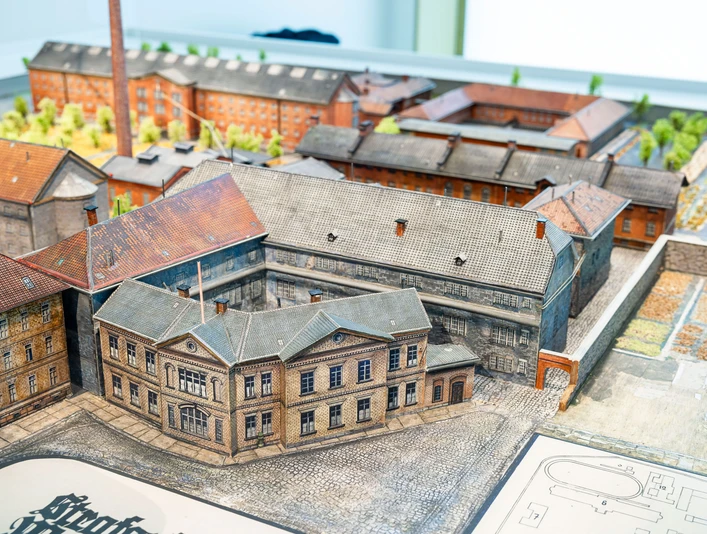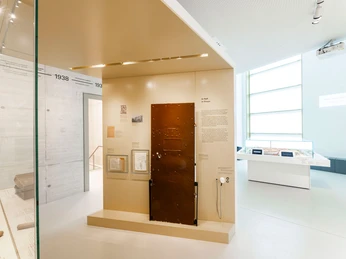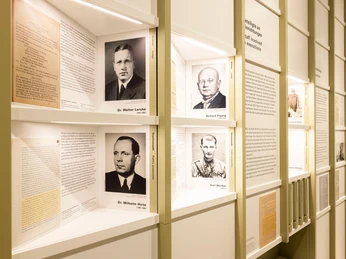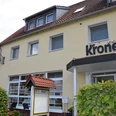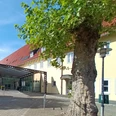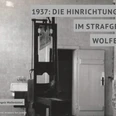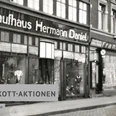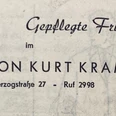- Photos & Map
How would you like to arrive?
- Call
- Description
- Good to know
- Nearby
The new Documentation Centre in the grounds of Wolfenbüttel Prison offers visitors a permanent multi-media exhibition entitled Law. Crimes. Consequences. The prison in Wolfenbüttel under National Socialism.
The exhibition, which was opened in 2019, examines historical events in the former penal institution in Wolfenbüttel. It explores continuities and discontinuities of the early German Federal Republic in terms of the penal code, the personnel and the language used. It also shows the lasting consequences of persecution and imprisonment on the families of the victims.
The unusual architecture of the new Documentation Centre gives an idea of the historical structures, the prison blocks and the execution building, which are still standing in the prison of today. Through an ‘augmented reality’ app, visitors can ‘virtually’ visit these places, which are normally accessible only with advance booking. Many different exhibits, original documents as well as audio and video applications tell the story of the prison’s inhabitants and those executed there.
The historical place
During the National Socialist era of persecution and murder, Wolfenbüttel prison served as the most important jail in the Land Braunschweig. From 1933 onwards the justice system increasingly imprisoned ‘dissenters’ and socially and racially excluded groups, homosexuals, and Jehovahs Witnesses. The Ministry of Justice used the prison here as the central jail for prisoners apprehended under the cover of darkness from France, Belgium, the Netherlands and Norway.
From 1937 the prison also acted as one of the central execution points in the Third Reich. By March 1945, 526 men and women were given the death sentence in accordance with National Socialist policy.
Until its liberation on 11 April 1945, more than 500 prisoners also died here, because of the drastically deteriorating conditions of imprisonment.
Ever since the end of the 1950s, survivors and family members of those who were executed and died here have visited the prison. Only in 1990, due to the commitment of local residents and survivors alike, the prison was given the status of A Place of Commemoration by the Ministry of Justice of Lower Saxony
The exhibition, which was opened in 2019, examines historical events in the former penal institution in Wolfenbüttel. It explores continuities and discontinuities of the early German Federal Republic in terms of the penal code, the personnel and the language used. It also shows the lasting consequences of persecution and imprisonment on the families of the victims.
The unusual architecture of the new Documentation Centre gives an idea of the historical structures, the prison blocks and the execution building, which are still standing in the prison of today. Through an ‘augmented reality’ app, visitors can ‘virtually’ visit these places, which are normally accessible only with advance booking. Many different exhibits, original documents as well as audio and video applications tell the story of the prison’s inhabitants and those executed there.
The historical place
During the National Socialist era of persecution and murder, Wolfenbüttel prison served as the most important jail in the Land Braunschweig. From 1933 onwards the justice system increasingly imprisoned ‘dissenters’ and socially and racially excluded groups, homosexuals, and Jehovahs Witnesses. The Ministry of Justice used the prison here as the central jail for prisoners apprehended under the cover of darkness from France, Belgium, the Netherlands and Norway.
From 1937 the prison also acted as one of the central execution points in the Third Reich. By March 1945, 526 men and women were given the death sentence in accordance with National Socialist policy.
Until its liberation on 11 April 1945, more than 500 prisoners also died here, because of the drastically deteriorating conditions of imprisonment.
Ever since the end of the 1950s, survivors and family members of those who were executed and died here have visited the prison. Only in 1990, due to the commitment of local residents and survivors alike, the prison was given the status of A Place of Commemoration by the Ministry of Justice of Lower Saxony
Good to know
Openings
While the documentation center with its permanent exhibition is freely accessible, a visit to the historical sites in Wolfenbüttel Prison is only possible for groups who register at least 14 days in advance.
The documentation center with the new permanent multimedia exhibition can be visited at any time during opening hours without prior registration.
The documentation center with the new permanent multimedia exhibition can be visited at any time during opening hours without prior registration.
Price info
Entry is free!
Other Furnishing/Equipment
Handicapped accessible WC
Barrier-free access
Accessibility
General Information on Accessibility
Directions & Parking facilities
Access to the memorial is via the Volksbank parking lot. There are no free parking spaces nearby (parking spaces with parking machines for a maximum of two hours). The Volksbank parking lot is only available to customers (barrier). Free parking is available within a ten-minute walk in the following streets: Grüner Platz, Teichgarten, Kapellenweg. The bus line 420 coming from Braunschweig stops near the memorial (bus stop "Breite Herzogstraße")
Social Media
Author
Lessingstadt Wolfenbüttel
Stadtmarkt 3-6
38300 Wolfenbüttel
Organization
Lessingstadt Wolfenbüttel
License (master data)
Lessingstadt Wolfenbüttel
Nearby
